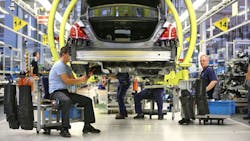German Factory Orders Fall Amid Weaker Foreign Investment Demand
German factory orders dropped off after two consecutive months of expansion in a sign that growth in Europe’s largest economy could be steadying after a strong start of the year.
Adjusted for seasonal swings and inflation, orders dropped 2.1% in April, after expanding an upwardly revised 1.1% in March, according to data released Wednesday by the Economy Ministry in Berlin. The typically volatile reading compares with a median estimate for a 0.3% decline in a Bloomberg survey. Orders were up 3.5% from a year earlier, when adjusted for working days.
“Slight upward momentum in output and sales, as well as stellar business climate, send strong signals for a continuation of the moderate upswing in manufacturing,” the Economy Ministry said in a statement, adding that bulk orders were below average in April.
After its best performance in a year in the first quarter, German economic prospects still appear to be positive. Business confidence is at the highest level since 1991 and manufacturers and service providers are seeing the fastest growth in six years. The Bundesbank predicts that the economy will continue to grow at a robust pace in the coming months, supported by “lively” foreign and domestic demand.
Orders were damped in April by a slump in investment-goods demand, primarily from countries outside the 19-nation euro area. Consumer-goods orders also fell, while demand for basic goods increased slightly.
The report comes one day before the European Central Bank will decide whether the euro-area economy is strong enough after 16 consecutive quarters of uninterrupted growth to signal that unprecedented monetary policy will gradually come to an end. So far, ECB president Mario Draghi has insisted that risks remain tilted to the downside even as the recovery is becoming increasingly robust, and argued that stimulus is still needed to boost inflation.
The Economy Ministry will publish industrial-production data on Thursday. Economists predict output rose 0.5% in April after falling 0.4% the previous month.
By Piotr Skolimowski, with assistance from Kristian Siedenburg and Andre Tartar.
About the Author
Bloomberg
Licensed content from Bloomberg, copyright 2016.
